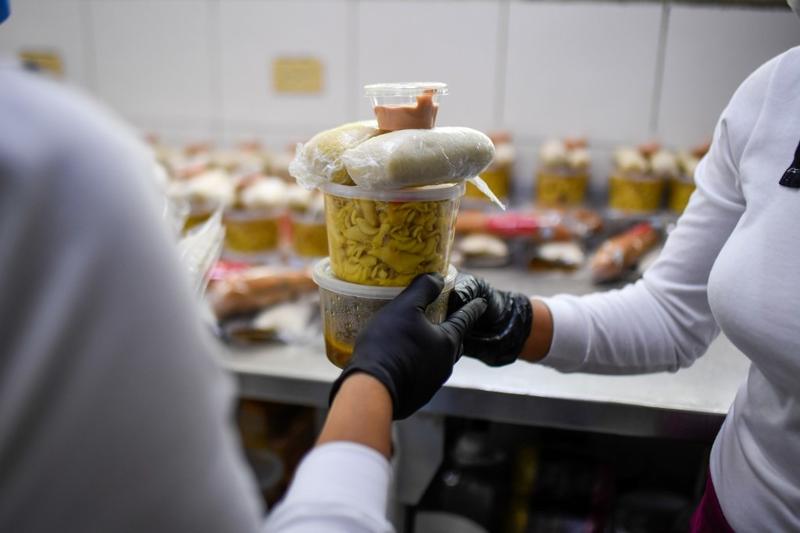 In this April 28, 2020 photo, volunteers prepare meal bags to be delivered to elderly people as part of the "Good Neighbor Plan", in Caracas, amid the lockdown aimed at stopping the spread of the novel coronavirus. (FEDERICO PARRA / AFP)
In this April 28, 2020 photo, volunteers prepare meal bags to be delivered to elderly people as part of the "Good Neighbor Plan", in Caracas, amid the lockdown aimed at stopping the spread of the novel coronavirus. (FEDERICO PARRA / AFP)
CARACAS - Venezuela has reached a deal with the UN Development Programme (UNDP) to destine part of its gold in Bank of England accounts toward the purchase of food and medicine during the coronavirus pandemic, its central bank governor said on Wednesday.
A six-year economic collapse in Venezuela has resulted in hyperinflation and shortages of basic goods, including food and medicines
The deal comes after Venezuela’s central bank made a legal claim earlier this month to try to force the Bank of England to hand over part of the 31 tonnes of gold in accounts belonging to the government of President Nicolas Maduro, whom Britain does not recognize as Venezuela’s legitimate leader due to allegations he rigged his 2018 re-election.
Central bank Governor Calixto Ortega told Reuters that under the arrangement, the UNDP would receive the funds directly, a move meant to assuage concerns about potential corruption.
ALSO READ: Venezuela files claim to force Bank of England to hand over gold
“It’s not my word, it’s not me saying that I am going to buy food, medicine and medical equipment,” Ortega said in an interview in his downtown Caracas office. “It’s the United Nations who is saying that. They are not going to be involved in anything dark that is not neutral and independent.”
Any program would still require the Bank of England to release the gold. The Bank of England declined to comment.
In a statement, the UNDP said it was “approached recently to explore mechanisms to use existing resources held by the Central Bank of Venezuela in financial institutions outside the country to fund the ongoing efforts to address the urgent humanitarian, health, and socioeconomic needs arising from the COVID-19 pandemic.”
Ortega said he was optimistic the legal case in Britain would be resolved in the coming weeks.
A six-year economic collapse in Venezuela has resulted in hyperinflation and shortages of basic goods, including food and medicines. Maduro blames US sanctions on the OPEC nation’s oil industry for its woes.
While those sanctions have slashed cash flow to the government, critics say corruption and misguided economic policies are the root causes of the collapse.
Venezuela has so far been less affected than neighbors by the coronavirus pandemic, with 1,245 cases recorded and 11 deaths. But its hospitals are in disrepair after years of underfunding, prompting concerns about preparedness for a larger outbreak.
READ MORE: Iranian tanker reaches Venezuela, domestic refining rises
“This is the worst a nation can experience,” Ortega said. “We have no income, no way of generating cash flow, and no access to funds we have deposited abroad in the middle of a pandemic.”
The government had previously requested US$5 billion from the International Monetary Fund to handle the pandemic, an embarrassment for a socialist government that has branded the IMF a tool of US imperialism. The IMF turned down the request due to a lack of consensus on Maduro’s legitimacy.



